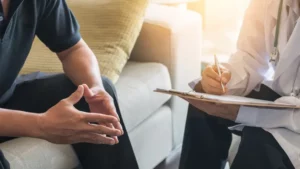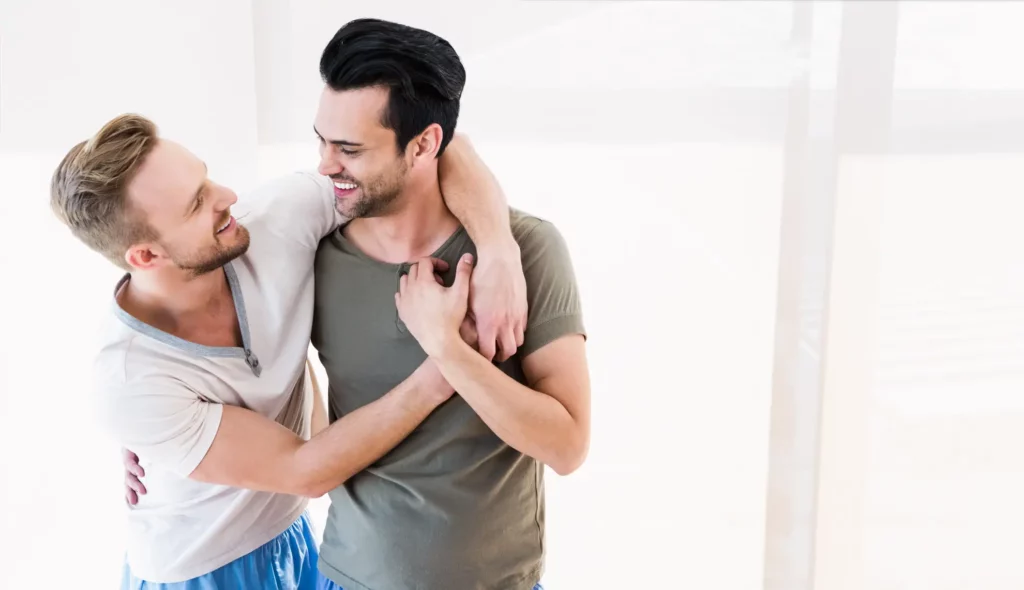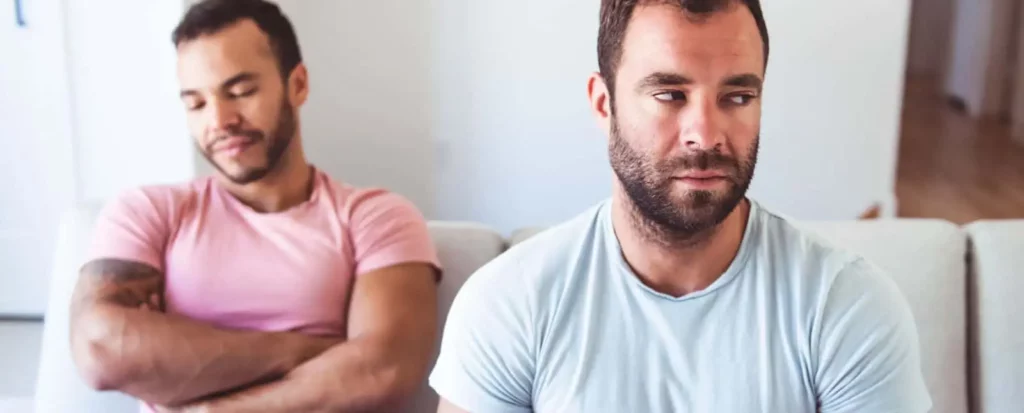Relationships are a tapestry woven from shared experiences, love, and understanding. Gay relationships, filled with equal amounts of affection and commitment, are no exception. However, just like any other bond, these relationships can also face problems, both from within and outside, impacting the harmony and happiness that they inherently deserve. In this blog, we will delve into some of these issues, understanding the unique struggles that can surface in a gay relationship. Moreover, we’ll also share strategies to tackle these issues, helping navigate the path towards healthier, more fulfilling relationships. So, let’s get started!
Contents
Common Relationship Issues That A Gay Relationship May Face
 Gay relationships, like any other, can face a variety of challenges. These obstacles are part of the journey that builds and shapes the relationship. Let’s delve into some of the most common relationship-specific issues that a gay relationship might encounter.
Gay relationships, like any other, can face a variety of challenges. These obstacles are part of the journey that builds and shapes the relationship. Let’s delve into some of the most common relationship-specific issues that a gay relationship might encounter.
- Communication Issues
Communication is the lifeblood of any relationship. However, not every individual is adept at expressing their feelings or thoughts. This can lead to misunderstandings, and over time, can strain the relationship. - Differences in Sexual Drive
Sexual compatibility is crucial for a fulfilling relationship. Differences in sexual drive can create tension, leading to feelings of dissatisfaction or inadequacy. - Unequal Power Dynamics
Power dynamics can creep into any relationship, leading to imbalance and resentment. One partner might dominate the decision-making process or have greater control over resources, which can stir up feelings of inequality. - Disagreements Over Roles and Responsibilities
In a gay relationship, there can sometimes be an expectation or pressure to conform to traditional gender roles. Such expectations can lead to disagreements and resentment if partners feel compelled to fit into prescribed roles. - Managing Outsider Perceptions
Couples in gay relationships often find themselves having to manage outsider perceptions, as people around them might harbor stereotypes or misconceptions. These pressures can put additional strain on the relationship.
Understanding these issues can pave the way for better communication and understanding within the relationship.
Problems That You May Face Outside Your Relationship
 While it’s crucial to address the challenges within a gay relationship, it’s equally important to recognize the obstacles that can arise outside of it. These external issues, often fueled by societal norms and prejudices, can cast a shadow over the relationship. Let’s shed light on some of these issues.
While it’s crucial to address the challenges within a gay relationship, it’s equally important to recognize the obstacles that can arise outside of it. These external issues, often fueled by societal norms and prejudices, can cast a shadow over the relationship. Let’s shed light on some of these issues.
- Societal Discrimination and Stigma
Gay relationships often face the brunt of societal prejudices and biases. Discrimination can take many forms, from snide comments to outright hostility, and can deeply affect the mental and emotional well-being of the individuals involved. - Legal Challenges
In some parts of the world, homosexuality is still criminalized or not legally recognized. This can lead to a lack of legal protections and rights, which can significantly affect gay relationships. - Acceptance from Family and Friends
Coming out to family and friends can be a challenging and anxiety-inducing process. The fear of rejection or disappointment from loved ones can add significant stress to a gay relationship. - Workplace Discrimination
Workplace discrimination is another external challenge that individuals in gay relationships might encounter. This can range from unequal career opportunities to a hostile work environment, which can affect both the individual and their relationship. - Mental Health Concerns
As a result of external pressures and discrimination, individuals in gay relationships often experience higher rates of mental health issues, such as anxiety and depression.
While these issues can seem daunting, it’s important to remember that support and resources are available.
How Can You Tackle These Issues?
 Navigating through the challenges of a gay relationship can seem like an uphill climb, but remember, there are ways to tackle these issues. Here, we discuss strategies that can help strengthen your bond and empower you to face these challenges head-on.
Navigating through the challenges of a gay relationship can seem like an uphill climb, but remember, there are ways to tackle these issues. Here, we discuss strategies that can help strengthen your bond and empower you to face these challenges head-on.
- Open and Honest Communication
When facing any relationship issue, clear and honest communication is key. Sharing your feelings, thoughts, and concerns can prevent misunderstandings and foster understanding and trust. - Seek Professional Help
Don’t hesitate to seek professional help when needed. Therapists and counselors, particularly those specializing in LGBTQ+ issues, can provide guidance, coping strategies, and mental health support. - Build a Support Network
Surround yourself with supportive people. Having a network of friends and family who accept and understand you can provide immense emotional support. - Advocate for Your Rights
Knowledge is power. Be aware of your rights, and do not hesitate to stand up against discrimination. Advocacy organizations can provide resources and support in this regard. - Self-Care and Mental Health
Prioritize your mental health. Seek professional help if you’re experiencing mental health issues. Remember, taking care of your mind is just as important as taking care of your body. - Patience
Patience is a virtue, especially when it comes to acceptance, both self and from others. It’s okay to give yourself and others time to understand and adjust.
Facing these issues might be challenging, but remember, you’re not alone. With the right strategies and support, you can overcome these hurdles and build a strong, healthy, and fulfilling relationship.
How Therapy Can Help You Overcome the Challenges?

Therapy or counseling can be instrumental in helping individuals in a gay relationship overcome their unique challenges. Here’s how:
- Unbiased Support: Therapists provide a safe, non-judgmental space for you to express your thoughts and feelings. They offer unbiased support, providing a fresh perspective on issues you may be struggling with.
- Strategies for Communication: Therapists can provide tools and techniques to enhance communication between partners, helping resolve conflicts and misunderstandings more effectively.
- Coping Mechanisms: Counselors can equip you with coping mechanisms to deal with external pressures such as discrimination, stigma, and lack of acceptance.
- Self-Esteem and Acceptance: Therapy can aid in enhancing self-esteem and facilitating self-acceptance, essential aspects for individuals grappling with their sexuality.
- Mental Health Assistance: Therapists trained in mental health issues can provide strategies to cope with anxiety, depression, or other mental health problems often associated with the stresses faced by individuals in gay relationships.
- Legal and Advocacy Advice: Some therapists can guide you towards legal and advocacy resources, empowering you to stand up for your rights.
Seeking therapy can be a valuable step towards resolving issues and enhancing the quality of your relationship. Remember, asking for help is not a sign of weakness but a strength that propels you towards a healthier relationship.
Conclusion
Gay relationships, imbued with the same colors of love and understanding as any other, can sometimes face unique challenges due to societal prejudices, legal hurdles, and self-acceptance issues. While these challenges may seem daunting, it’s important to remember that there are ways to overcome them.
Above all, patience and perseverance can guide you through these challenges, leading to stronger, healthier, and more fulfilling relationships.
Life may sometimes be challenging if you are a gay, but Online Gay Counseling can help. Get experienced LGBTQ therapists at PrideMantra: Book a trial LGBTQ therapy session


